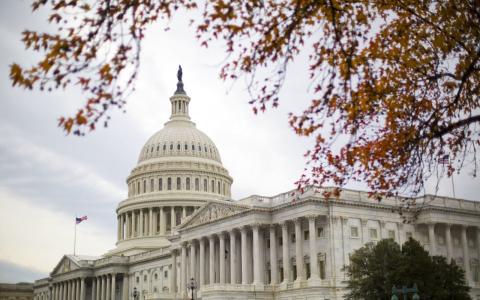
First, Republicans let go of their border adjustment tax, which would have taxed imports and subsidized exports.
Earlier this week, we learned that they are rethinking the plan to end the deduction for state and local taxes, a nakedly partisan swipe at Democratic states with higher taxes.
Now the Wall Street Journal's Richard Rubin reports that the GOP's long-held ambition — and Donald Trump's campaign promise — to quash the estate tax may itself be quashed — yes, by other Republicans.
Conservatives have long held up the estate tax as the scourge of the American entrepreneurial spirit, so the question is, should small businesses care?
The answer: only about 80 of them.
That's the number of small businesses and farms that will be subject to the estate tax in 2017, according to the Tax Policy Center.
When it comes to small business, the effects of the estate tax are purely aspirational.
And repealing it is yet another example of a small-business tax cut that won't really help small businesses, but will deliver huge savings to super-rich.
The fact is that since the turn of the century, the estate tax has had its sails sharply trimmed. It applies only to estates that exceed, after deductions and such, $5.49 million in 2017. Only the excess over that figure is taxed.
The tax on the portion of the estate over the exemption gradually increases, leveling off at 40% when the amount reaches $1 million.
In 2001, by contrast, the exemption stood at just $675,000, and the top tax rate was 55%.
The share of people who've died leaving taxable estates has fallen from 2.2% in 2000 to just 0.2 percent this year.
According to the Tax Policy Center, only 5,500 people will actually owe estate tax in 2017.
It's this success at thoroughly defanging the estate tax that seems to have stalled the momentum for repealing what's left of it.
The main holdout once again appears Senator Susan Collins of Maine, the same Senator Collins who repeatedly sank the Obamacare repeal bills. Collins told Rubin that repealing the estate tax isn't a priority for her because "we’ve taken care of the problem for the vast majority of family-owned businesses or ranchers in this country."
Other senators were willing to trade it away in order to win support from potential holdouts like Collins.
So if the estate tax goes, what happens next for the tax plan? Jonathan Chait, a liberal pundit at New York, argues that "it has essentially failed already."
Eventually, Republicans are going to figure out they can’t reform the tax code. After their plan collapses, they will regroup, and come up with a plan B that consists of another Bush-style tax-cut bill. They will pressure recalcitrant members of Congress to vote for it, making the argument that another legislative failure will bring about a midterm-election debacle. The tax-cut plan will be unpopular, but less unpopular than the Obamacare-repeal plan that they tried to muscle through on the same basis, and it will pass.
So there's that.



